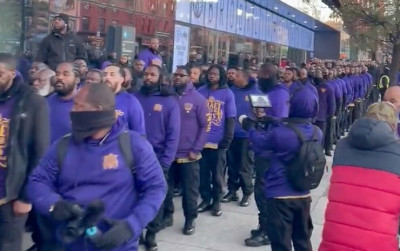
Everywhere we look these days, it seems like America is descending further down the rabbit hole of hatred, partisanship, division, and accusation. What’s been happening over the course of the past decade has not seen any marginal reversal, despite the promises from many to make it so. Actors from both the Left and Right side of the political aisle raise the question of “Is it acceptable to be Jewish?”
The threats to anyone who is openly and obviously religious vary. Chasidim could be attacked in the street for simply walking down the block. Verbal assaults could be thrown by Black Hebrew Israelites who parrot the talking points expressed by Kanye West. And your business could be sued out of existence if you don’t support gay marriage. All of these threats are equally real, even if not equal in their risk of bodily harm.
The Anti-Defamation League (no right-wing outlet) reported an increase in anti-Semitic attacks for the year 2021. Acts of harassment, vandalism, and assault all had a marked increase from the year before, focusing on the areas with the highest Jewish population. Videos abound, displaying acts of violence ranging from a simple knocking off of a hat to a far more severe beating simply for “looking Jewish.”
Black Hebrew Israelites marched in support of Kyrie Irving at the Barclay Center in Brooklyn, proclaiming, “We are the real Jews.” There’s a video of them claiming that they “like Hitler” and that Hitler was killing the Jews because he knew who “the real Jews were.” The killers behind two separate attacks in 2019, one that killed four people in a kosher supermarket and another that killed a rabbi, claimed to have been a part of these groups.
These are the threats and violence that Jews specifically must face, and these are the types of attacks that have strong universal condemnation. It is severely disingenuous for anyone to claim that politicians don’t care about this issue, yet everyone has his or her blind spots. On the Right, there are those who will not wholeheartedly condemn Trump for a dinner with anti-Semites like Kanye West or Nick Fuentes because they know that doing so is a political landmine. Your words are wielded against you as a weapon on the very next question by the media, because you will be asked, “Will you support Trump in 2024” or “Isn’t Trump worse than Hitler” or some other nonsensical question. On the Left, there will always be those who refuse to fully address the problem with rising anti-Semitic attacks, because the attackers are members of a “marginalized” and protected group, namely Black men. When Jews are attacked by a white man, Democrats can’t find news cameras fast enough to denounce the scourge.
Yet these are not the only threats Jews face, and the other threats actually affect all religiously observant people. This is the threat from the government to punish people for adherence to their own religious precepts. Congress passed the inaccurately named “Respect for Marriage Act,” which enshrines gay marriage into law. This passage is made even more remarkable because it did not include one of the three amendments offered by Republicans that would explicitly protect religious people. The bill makes clear that institutions, organizations, or employees of organizations are protected from performing services for gay marriage, but it does not protect individuals outside of said organizations and institutions. This does not protect, for example, Jack Philips of Colorado from baking a cake for a gay wedding against his religious beliefs. This bill would not protect any kosher bakery or flower store or photographer from refusing to participate in a wedding that they do not condone for religious reasons.
This is a case that is in front of the Supreme Court this week. “303 Creative” is a website whose founder did not want to create web pages for gay couples. The State of Colorado pursued this to the Supreme Court. The liberals on the court made the case that there is no difference between objections to same-sex couples and to interracial couples.
This is dangerous ground. There are legitimate distinctions between the two, even outside the confines of religion. This would be the equivalent of the State of New York forcing a website like OnlySimchas to post same sex couples, with the claim that not doing so is the equivalent of refusing a post between a Sephardic and Ashkenazic couple.
To say this isn’t a threat on Jews is to pretend that Judaism as a religion is not worth preserving. Judaism is very clear where it stands on these issues, even if many Jews themselves have no issue with it. If you care about Judaism and the Jewish people, it’s imperative to recognize not only attacks on the Jewish body, but also the Jewish soul.
By Moshe Hill
Is It Okay To Be Jewish In Public?
Typography
- Smaller Small Medium Big Bigger
- Default Helvetica Segoe Georgia Times
- Reading Mode




